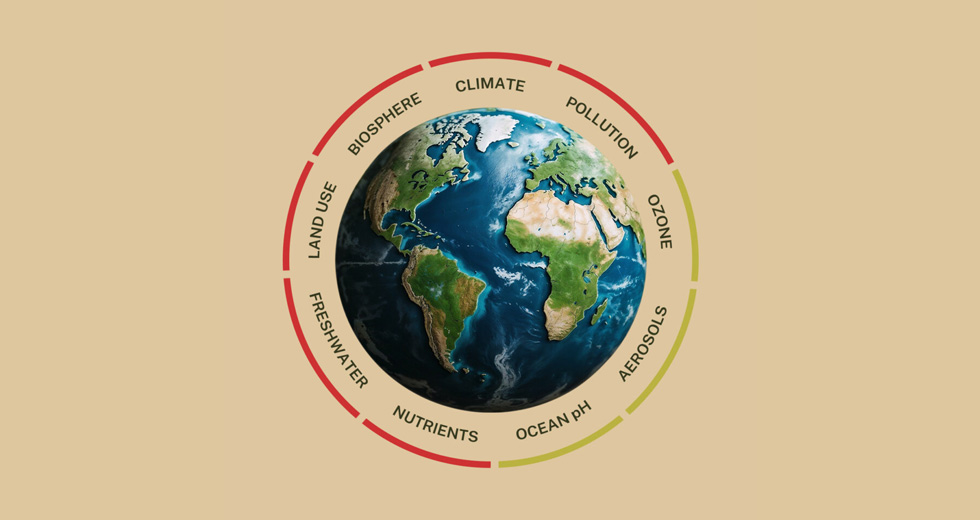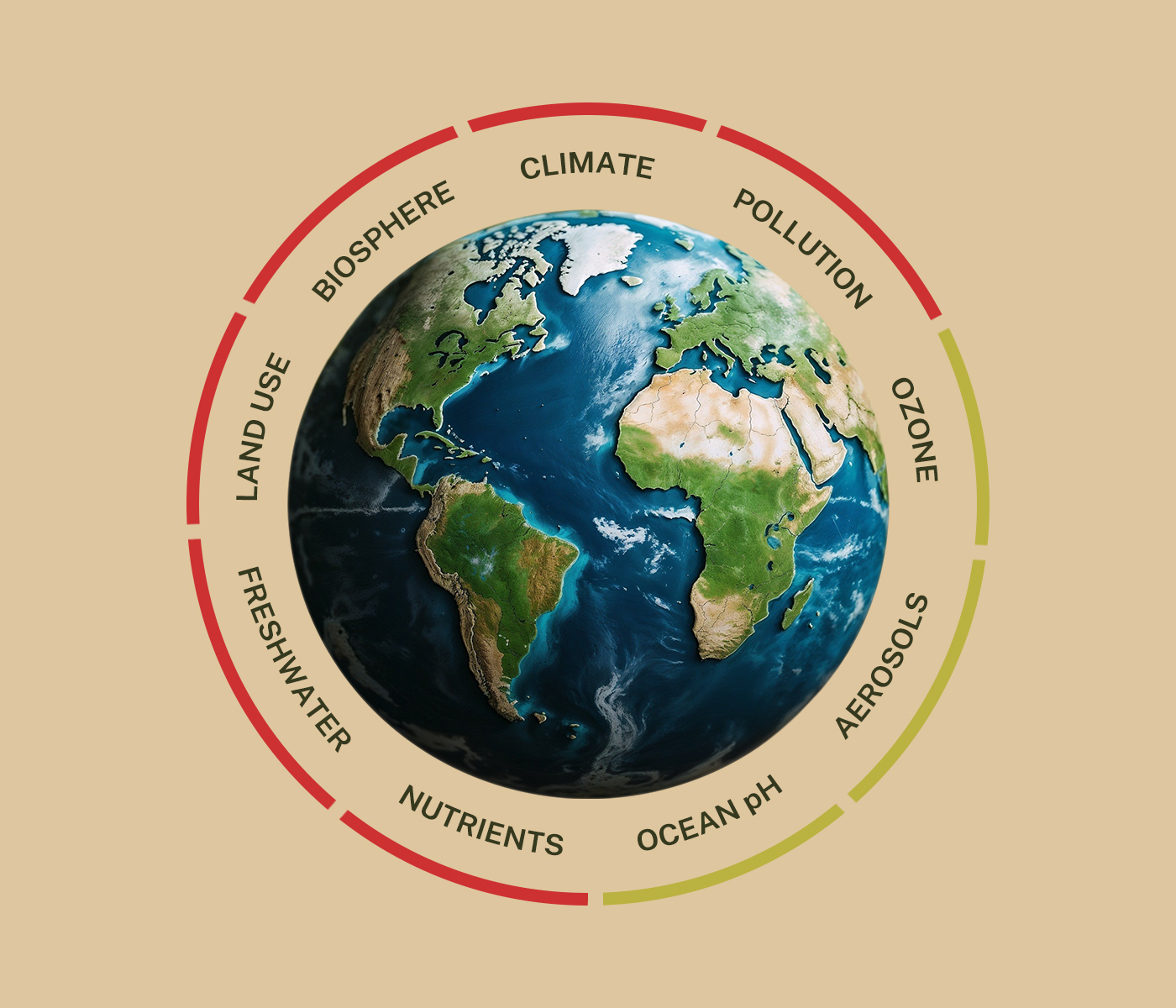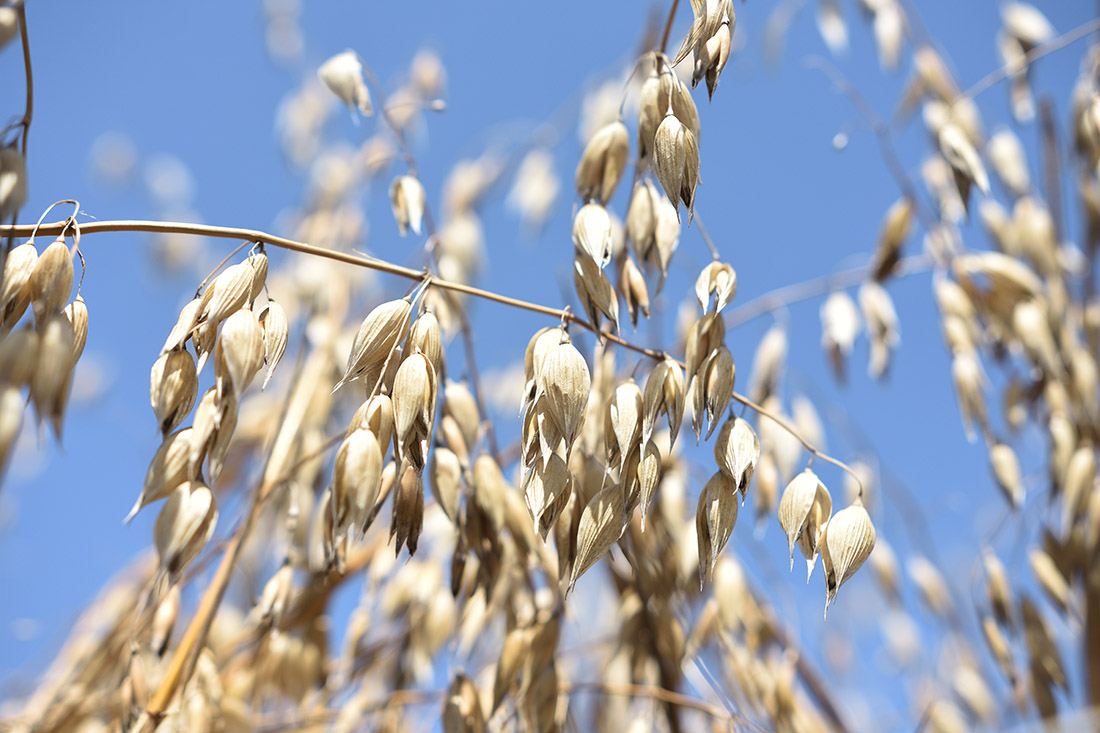Njamito Goes Fairtrade for Cocoa and Vanilla
March 31, 2025Njamito is now Fairtrade certified for cocoa and vanilla! Here’s what that means for farmers, the planet, and the values behind our meal-in-a-bottle.
Read articleBreaching planetary boundaries impacts Earth stability and resilience. Transforming the food system to a sustainable one and adopting climate-friendly diets help mitigate environmental risks.

The future of life on Earth is increasingly uncertain as human activities push the planet beyond its limits, known as planetary boundaries. The Planetary boundaries framework identifies nine critical Earth system processes that regulate the state of the planet, and the thresholds within which humanity can safely operate. By exceeding these boundaries, we risk triggering irreversible environmental changes that could lead to catastrophic consequences for both human civilization and natural ecosystems (Rockström et al., 2009).
As of 2024, six of the nine planetary boundaries have been breached, as reported in the 2024 Planetary Health Check (Caesar et al., 2024). The global food system, one of the largest drivers of these transgressions, plays a central role in driving changes that affect climate stability, biodiversity, water resources, and soil health. Urgent and transformative action is needed to ensure a sustainable future for humanity and the planet.

The concept of planetary boundaries was first introduced in 2009 by a team of scientists led by Johan Rockström and has since been updated. This framework now identifies nine crucial Earth system processes that determine the state or the health of our planet (Rockström et al., 2009). These planetary limits provide a “safe operating space” for humanity, enabling development and growth without causing irreversible environmental damage. When these boundaries are breached, the likelihood of severe environmental disruptions increases.
The nine planetary boundaries include:
As of 2024, six of the nine planetary boundaries have been crossed, according to the 2024 Planetary Health Check Report (Caesar et al., 2024). These include climate change, biosphere integrity, biogeochemical flows, land-system change, freshwater use, and the introduction of novel entities. The transgression of these planetary limits indicates that human activities are exerting immense pressure on Earth’s systems, pushing them toward instability.

One of the most alarming trends is the acceleration of climate change, with CO₂ levels higher than they have been at any point in the last 15 million years. This warming has profound effects on weather patterns, rising sea levels, and the frequency of extreme weather events (Caesar et al., 2024). The continued loss of biosphere integrity, with species extinction rates far exceeding natural levels, is reducing ecosystems’ resilience and limiting their ability to adapt to environmental changes.
Although ocean acidification has not yet crossed its threshold, it is dangerously close. As the oceans absorb more CO₂, their ability to act as a carbon sink diminishes, which harms marine ecosystems, particularly coral reefs and shell-forming organisms (Caesar et al., 2024). Meanwhile, biogeochemical flows have been significantly altered due to excessive fertilizer use, creating dead zones in oceans and freshwater systems.
The remaining three planetary boundaries—ozone depletion, atmospheric aerosol loading, and ocean acidification—are still within safe limits but remain vulnerable. The recovery of the ozone layer is progressing but requires ongoing international cooperation to ensure its full restoration (Caesar et al., 2024).

The food system, often overlooked compared to the use of fossil fuels, is among the largest drivers of environmental degradation and a major factor in exceeding planetary boundaries. Overall, almost half of all global food production currently depends on planetary boundaries transgressions. (Kummu et al., 2017). Agriculture alone occupies 40% of the Earth’s ice-free land and consumes more than 70% of global freshwater resources (Caesar et al., 2024). The environmental impacts of food production are far-reaching and extend across multiple planetary limits:

Willett et al. (2019) have identified preliminary planetary boundaries related to the food system, addressing only five of them. While more detailed assessments are underway, the following implications can already be observed:
The message is clear, local actions impact the planet, and a planet under pressure can impact everyone, everywhere. If our oceans die, glaciers continue to melt, and we keep depleting the soil and biodiversity, it will drastically affect our lives. We are in this together and we need to start living in harmony with the planet.
To keep Earth within its planetary boundaries, the food system must prioritize sustainability through three essential measures:

What we need now are practical solutions so that everybody in the agrifood sector can act on making the transition towards a more sustainable future. At LoginEKO, we’re developing practical, scalable solutions to help farmers, food producers, and consumers transition to a sustainable food system. By making this knowledge and tools accessible, we aim to drive meaningful change for the benefit of current and future generations.
By promoting sustainable farming practices like crop rotation, conservation tillage, and agroforestry, we aim to improve biodiversity and ecosystem resilience. We recognize that farmers face challenges when transitioning from conventional to sustainable practices. That’s why our team of agronomists is creating concrete solutions to ease this transition, focusing on large-scale, sustainable production methods.
Our efforts are already yielding results: across our 3,700 hectares of organically certified fields, we produce more than 8,700 tons of organic crops annually. This success demonstrates the effectiveness of sustainable farming practices, which phase out synthetic fertilizers and pesticides while maintaining healthy soil and pest control.

The EAT-Lancet Commission provides a clear framework for transforming global food systems within planetary boundaries. A key recommendation is to shift toward plant-based diets, increasing the consumption of fruits, vegetables, whole grains, legumes, and nuts while reducing red meat, processed foods, and sugar. This transition could lower greenhouse gas emissions, reduce land and water use, and protect biodiversity (Willett et al., 2019). By adopting more plant-based diets, we can ease the strain on resource-intensive livestock farming, which drives deforestation, water consumption, and methane emissions.
At LoginEKO, we understand that changing diets can be challenging in today’s fast-paced world. Learning to prepare new plant-based meals or comparing the protein content of a chickpea burger to a beef burger takes time, which is often in short supply.
To address this, our Food Development team created Njamito, a healthy, eco-friendly product designed for busy lifestyles. Following its success in Slovenia, we’re now expanding our sustainable solutions for the food industry, helping food companies develop climate-friendly products that benefit both human health and the planet.

We firmly believe that by transforming our food systems, adopting sustainable diets, and embracing sustainable farming practices, we can ensure a more stable and resilient future for Earth and humanity.
Caesar, L., Sakschewski, B., Andersen, L. S., Beringer, T., Braun, J., Dennis, D., … & Rockström, J. (2024). Planetary Health Check Report 2024. Potsdam Institute for Climate Impact Research. Download PDF document.
Rockström, J., Steffen, W., Noone, K., Persson, Å., Chapin, F. S., Lambin, E., … & Schellnhuber, H. J. (2009). A safe operating space for humanity. Nature, 461(7263), 472-475. https://doi.org/10.1038/461472a
Willett, W., Rockström, J., Loken, B., Springmann, M., Lang, T., Vermeulen, S., … & Murray, C. J. (2019). Food in the Anthropocene: The EAT-Lancet Commission on healthy diets from sustainable food systems. The Lancet, 393(10170), 447-492. https://doi.org/10.1016/S0140-6736(18)31788-4
McDermid, S., et al. (2023). Irrigation in the Earth system. Nature Reviews Earth & Environment, 4(6), 435–453. https://doi.org/10.1038/s43017-023-00345
Kummu, M., et al. (2017). Bringing it all together: Linking measures to secure nations’ food supply. Current Opinion in Environmental Sustainability, 29, 98–117. https://doi.org/10.1016/j.cosust.2017.12.006
Njamito is now Fairtrade certified for cocoa and vanilla! Here’s what that means for farmers, the planet, and the values behind our meal-in-a-bottle.
Read articleIdealism met reality as we launched our meal-in-a-bottle, Njamito. After 100.000 bottles sold, here’s what we learned about organic food and market adaptation.
Read articleWith organic seeds in short supply, we launched our own organic seed production journey to secure sustainable farming practices.
Read article